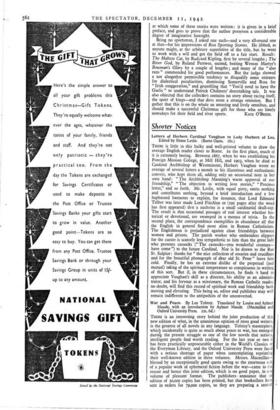Letters of Herbert Cardinal Vaughan to Lady Herbert of Lea.
Edited by Shane Leslie. (Burns Oates. as.) Shorter Notices THERE is little in this bulky and well-printed volume to draw the average English reader closer to Rome. In the first place, much of it is extremely boring. Between 1867, when he was establishing his Foreign Mission College, at Mill Hill, and 19o3, when he died as Cardinal Archbishop of Westminster, Herbert Vaughan wrote an average of several letters a month to his illustrious and enthusiastic convert, who kept them all, adding only an occasional note in her own hand: "The Archbishop Manning's warm approval of our friendship," "The objection to writing love stories," "Precious letter," and so forth. Mr. Leslie, with equal piety, omits nothing and contributes nothing, beyond a brief introduction and a few haphazard footnotes to explain, for instance, that Lord Edmund Talbot was later made Lord FitzAlan or (191 pages after the word has first appeared) thu a zuchetto is a small cardinatial skull-cap. The result is that occasional passages of real interest whether his- torical or devotional, are swamped in a morass of trivia. In the second place, the correspondence exemplifies in abundance all that the English in general find most alien in Roman Catholicism. The Englishman is prejudiced against close friendships between women and priests. The parish worker who embroiders slippers for the curate is scarcely less sympathetic to him than the great lady who presents cassocks (" The cassocks—you wonderful creature— have come ") to the future Cardinal. Nor is he drawn to the Rue Sr Sulpice: thanks for " the nice collection of rosaries and crucifixes and for the beautiful photograph of dear old St. Peter" leave him cold. Finally, he has an extreme dislike of the perpetual (and mutual) taking of the spiritual temperature so conspicuous in writing of this sort. But if, in these circumstances, he finds it hard to appreciate Vaughan's skill as a director, his ability as an adminis- trator, and his fervour as a missionary, the Roman Catholic reader, no doubt, will find this record of spiritual work and friendship both moving and elevating. This being so, editor and publisher may well remain indifferent to the antipathies of the unconverted.


























 Previous page
Previous page